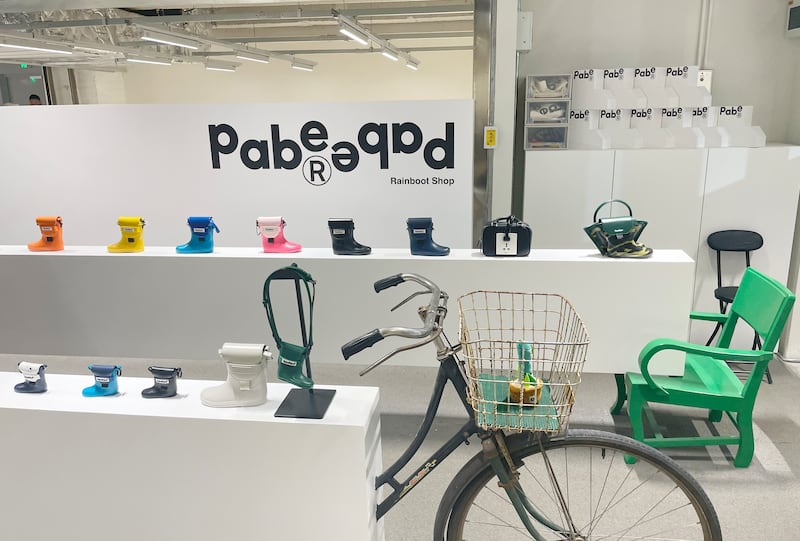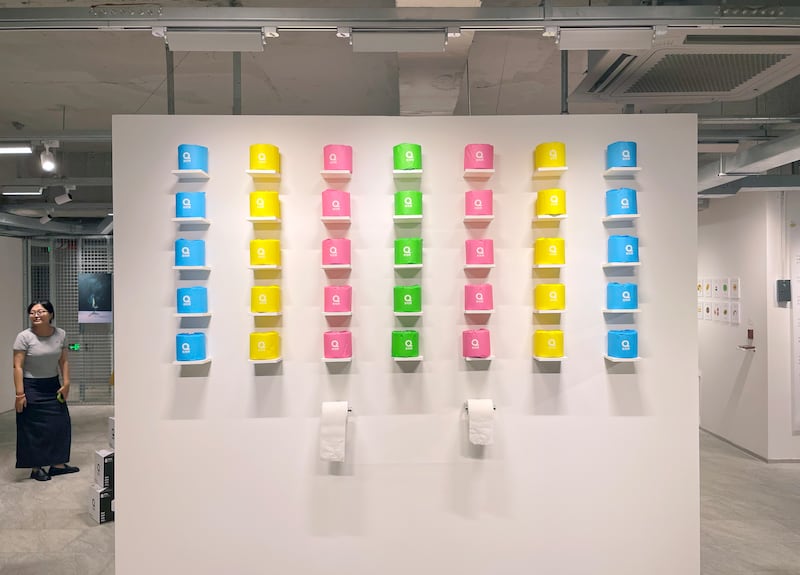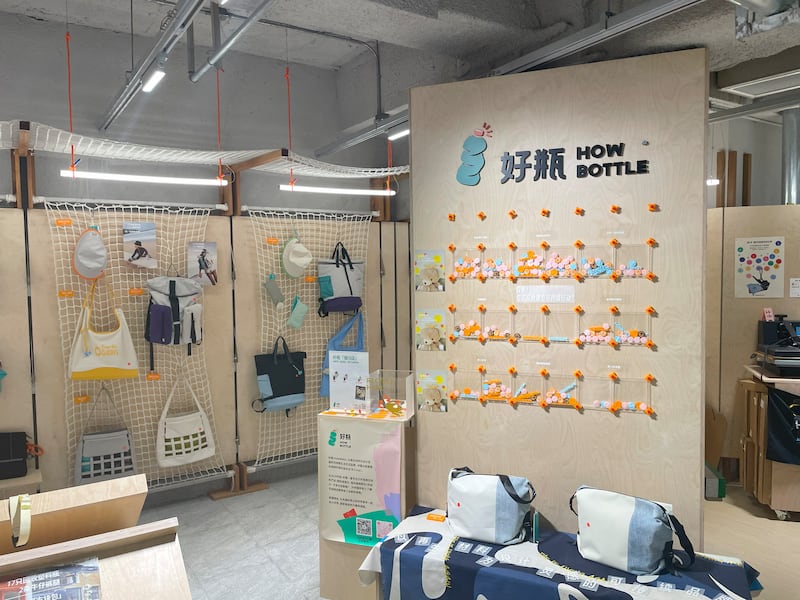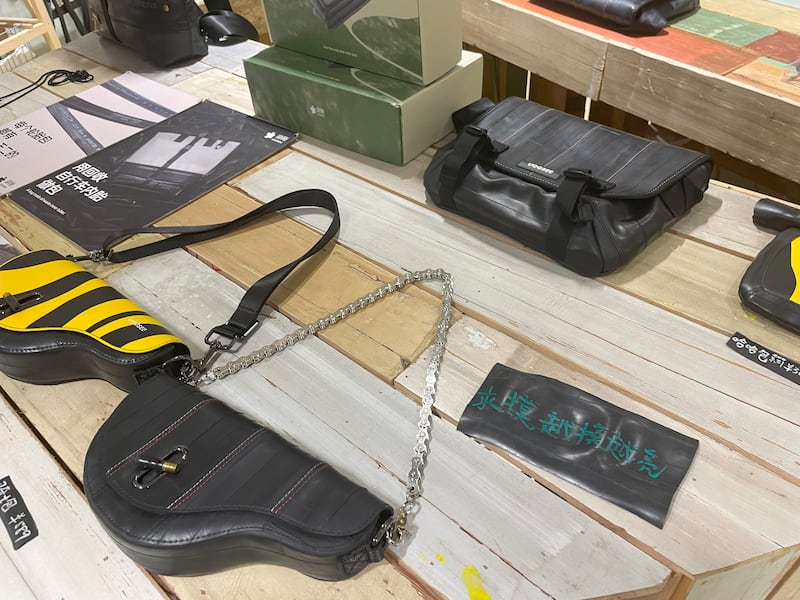Lined with department stores, malls and flagship stores for global fashion brands, Huaihai Street has been described as Shanghai’s answer to Fifth Avenue or the Champs Elysees. But at the ultimate street destination, most clothes are produced by small local brands using materials such as old plastic bottles and used bicycle tubes.
Spanning more than 7,000 square meters over eight floors in what used to be a bright pink Barbie store, HAI550 opened last month as China’s first sustainable lifestyle mall. Backed by Yangor, a Chinese fashion retailer that owns international brands such as Undefeated and Helly Hanson and has a stake in Alexander Wang, it is targeting affluent customers.
“Our clients are usually well educated, have overseas experience and love design. They respect the original designs.
“All the materials are recycled. The leather is recycled. The denim is recycled from plastic bottles and the sole is made from natural rubber and wine cork.
China’s green transition has been remarkable in recent years as massive investment in renewable energy sources has made the country a global leader in solar and wind power, as well as electric vehicles. Visitors who have returned to the country after several years point to improved air quality and quieter streets in cities where half the cars are electric.

But as the global headquarters of fast fashion, with companies like Shein and Temu, China is also one of the largest producers of textile waste. More than 26 million tons of clothes are thrown away in China every year, most of which are made of synthetic fabrics, and many of which end up in landfills.
The ground floor of HAI550 is intended for pop-up booths and art exhibitions, and the escalator to the other floors only goes up to save energy. Each floor has a mix of shops selling perfume, fashion, jewelry, sportswear and outdoor clothing, as well as organic food.
Uooosee makes bags from bicycle tire inner tubes, while art accessories brand PabePabe produces novelty rain boots. Prices are generally higher than typical fashion malls on Huaihai Street, but Wang believes customers at shops like his are looking for something different.
“Since our design is very minimal and timeless, we don’t have a lot of products. We also value sustainable design. This is not a fashion design. “Sustainability, concept and philosophy are also leading in design.”
“It’s still new in China, but because the population is so large, we definitely have our community. It’s not for everyone. But Shanghai is definitely a good place to be.”

On the fourth floor of HAI550 this month, an exhibition of food-themed artworks, including paintings, photographs and ceramics, was held. In front of the displays, a wall was lined with rows of toilet paper in different colored packages, with two rolls hanging from holders for customers to hold.
Qtopia is a sustainable toilet paper brand launched this month by Jeremie Thircuir, a French art curator, publisher and ceramic artist who has lived in Shanghai for 18 years. Qtopia is made entirely of bamboo, which grows quickly, is cut instead of cut, fills quickly, and is abundant in China.
People always think of toilet paper as a really mundane thing, but because it’s an item that everyone uses in huge quantities, the impact it has on the environment is tremendous. Millions of trees are cut down every week just to produce toilet paper.
But if you can suddenly make a difference in the material for people, then you can have a huge impact. You destroy about 40% of the world’s trees because of paper production. Half of it is spent on toilet paper. So it’s like 20% of trees.
HAI550 provides a storefront for Qtopia, but almost all of its sales and marketing are online, where the product is sold at a premium price. But Thircuir hopes to use his contacts in the art world to create a culture around the brand by commissioning artists to design different packaging for the toilet rolls every few months.

“The brand name in English is Qtopia. The Chinese name also sounds like utopia, but to be literal, it reads like a world without s**t. So really, the question of utopia is very important in the world and especially in China. “I think everyone is thinking about what future we want, what ideal world we want to live in.”
“People want brands with more values. People want brands that have something to say, more local brands, more local products, products that are more rooted in Chinese culture. So I think for people, it’s very, very important. Therefore, basically, shopping malls should be the mirror of young consumer’s desire.
[ China unleashes stimulus in bid to lift growthOpens in new window ]
China’s economic slowdown since the coronavirus pandemic and the three-year slump in the property market have made many consumers more cost-conscious than before. One worker at HAI550 told me that when he buys something himself, he thinks about price first, then design, and then the environment.
China does not share the “dialectic of sanctity” surrounding the environment in Europe, and sustainable practices have not trickled down to consumers, Thirquoir acknowledged. But he sees attitudes changing and suggests that change is likely to come from the top in China as well as the bottom.
At the political level, policies are implemented for greater sustainability. When you look at brands, more and more they are trying to incorporate sustainable practices into their operations. More and more brands are trying to be more sustainable. Many young Chinese who have gone abroad to continue their studies have also become sensitive to issues such as ecology, global warming, and all of these.

In my opinion, politically, there is a possibility that at some point the government will say no more plastic bags. Then there will be no more plastic bags. The scalability of actions means that it is more likely to happen at the political level than at the personal level. I strongly believe that China can implement these policies. I think the economy has slowed down a bit at the moment, which means the government has to find new mechanisms to generate growth. I think most people agree on sustainability, and sustainable products would be one of those factors. So I am very optimistic.”
- Register for Push notifications And get the best news, analysis and opinion delivered straight to your phone
- find Irish Times on WhatsApp And stay updated
- Our In The News podcast is now published daily – find the latest episode here
#Chinas #sustainable #lifestyle #mall #latest #move #impressive #green #transition